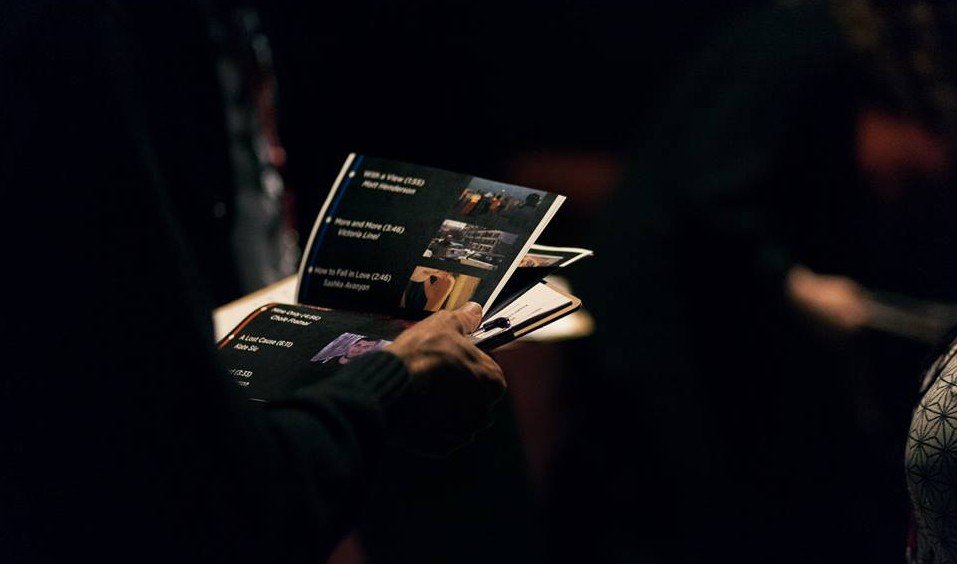The Fokus Film Festival, an annual event organized by TVM: Student Television at McGill, took place at Cinema du Parc last week, where student filmmakers had the opportunity to submit their work to be screened in a public forum. Three directors with screened works shared insight on how to get started in the filmmaking process as well as the challenges faced by student filmmakers.
“McGill, in my opinion, as an academic institution, isn’t very accommodating to a lot of creative souls, especially ones who want to practice and create in film and television,” said Lou Gatti, U3 Arts, who had his films Waterway to Stardom: Who is Flood Girl? and Getaways screened at Fokus. “That’s where TVM has aided myself and […] a lot of other filmmakers in the community with an understanding of process.”
McGill’s Faculty of Arts offers only a minor in World Cinema, which Gatti, as well as fellow director Ben Koring, U3 Arts, agreed can be disappointing for aspiring filmmakers wishing to learn more about the field.
“Other than TVM, which is great because they have a lot of content coming out, McGill isn’t great for film,” Koring said. “It’s got everything. But no film school, not great film classes, I’ve only been able to take one or two so that is a bit frustrating.”
At the same time, Sashka Avanyan, U1 Arts, who had three films screened at Fokus: Babushka, Moscow I Miss You, and How To Fall In Love, noted that McGill's high academic calibre can be a source of inspiration for student filmmakers.
“Being in an environment where there are so many successful people and just knowing that you’re on campus where there’s so much knowledge and academics at a very high level […] that’s inspiring in itself because it makes you want to strive to that level,” Avanyan said.
Another hurdle for many student filmmakers is the time constraints felt by those who balance academics with their craft, instead of choosing to combine both into a single degree. Time becomes a highly coveted resource for most creatives minds who recognize that there is a constant pull and push to stay active in academic life at McGill while still pursuing personal creative passions.
One way several directors mitigated the time constraints faced by student filmmakers, as well as gained practical experience in the field, was through a filmmaking competition sponsored by TVM. Directors were instructed to write, shoot, and edit an entire film within 72 hours. One of Avanyan’s films Babushka as well as one of Koring’s films Karma Police—both which were screened at Fokus—were products of this competition.
For Koring, these time and resource constraints, whether they are due to simply being a student, or the regulations imposed by events like 72-hour competitions, can be put to use in a productive manner. For example, while Koring’s submission was shot entirely on iPhones using an app he bought for $15, this app ultimately complimented the goofy style of the mockumentary film he was creating. Additionally, the angel costumes used in the film were made by a friend’s girlfriend while another musical buddy helped create the ‘Larry David-esque’ theme music and the other sound effects.
“I have a philosophy that’s […] use your limitations whether it’s 72 hours, or a concept, or your equipment, to your own advantage,” Koring said. “Don’t see it as an inhibitor, see it more as a framework to work within. I only know this many people, I know these locations we can use, I only have this equipment […] You have to make your concept based on those constraints.”
Besides the challenges, rewards, and community that are fostered by creative endeavours, there are still certain aspects of the creative process that Avanyan does not want to go unnoticed. Women in industry, and specifically women in the film industry, are topics she has been exploring since her first submission to Fokus last year with a documentary piece on femininity. The 10 minute film paralleled interviews featuring Armenian women and Canadian women; however, now she hopes to release a newer twist on the film which features the more refined technical skills she has gained over the past year.
“Everyone I look up to in the film industry is male, and there are definitely female editors and directors that are stellar and fascinating, but they don’t have as much visibility,” Avanyan said. “It’s really, really visible that there aren’t enough women in the industry in the roles of direction and editing […] I think it’s important to be conscious of that, no matter what your gender is.”
The parting advice that the student filmmakers have for students looking to get into filmmaking at McGill is to get involved in the creative process, whether that be through writing or editing, and by joining groups such as TVM or participating in events like Fokus. In the bigger picture, becoming involved in the McGill filmmaking community has led some of these directors to think differently about their future in film.
“When I came to McGill […] I did not have a clear idea in my mind that I wanted to pursue film,” Avanyan said. “Last year was my first year and I had four films shown at Fokus [….] I remember that was a very clear jumping board for me because I met a bunch of filmmakers here at McGill. They were talking to me about how they had stayed involved with film during their time at McGill and then […] I very concretely decided that this is what I want to pursue.”









